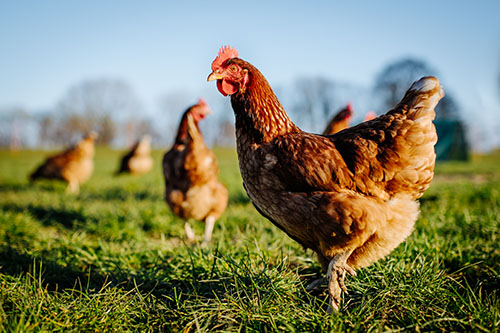A Guide to Pecking Order
Oct 12, 2023

A flock’s interactions are governed by a social structure known as the “pecking order.” This pecking order is not just about who gets to peck at whom; it is a complex hierarchy that regulates everything from access to food and water to determining who gets the best roosting spot.
Understanding your flock’s social organization can help to reduce tension and stress in the coop. In this blog, we will explore the dynamics of pecking order and the benefits it offers to your chickens.
Defining the pecking order
The pecking order is a term that describes the social hierarchy among chickens that allows them to establish and maintain order within the flock. This hierarchal system helps to reduce conflict and maintain stability by assigning each chicken a specific rank or position within the group.
Understanding the hierarchy
In a typical chicken flock, you’ll find a clear structure with one or more dominant birds at the top and subordinate ones further down the ranks. The hierarchy often involves three interconnected levels: relationships among the males, relationships among the females, and relationships among both the males and females.
Roosters are generally at the top of the pecking order, followed by hens, cockerels, and then pullets. As cockerels mature, though, they will work their way through the hens to establish their place among the roosters. In the same way, pullets will work their way up the female ladder as they mature.
Interestingly, a bird’s comb style also influences their pecking order rank. The highest-ranking roosters generally have the largest combs, and those with single combs usually rank higher than chickens with other comb styles.
Factors affecting the hierarchy
Benefits of the pecking order
Understanding your flock’s hierarchy is crucial for managing your flock effectively. By respecting the natural order of your chickens and providing them with the appropriate care, you can maintain a healthy and happy coop where each bird knows its place in the pecking order.
Your local Co-op has all the poultry supplies you need for your flock. Find the nearest store location here.
For more content like this, check out the latest issue of The Cooperator.
Understanding your flock’s social organization can help to reduce tension and stress in the coop. In this blog, we will explore the dynamics of pecking order and the benefits it offers to your chickens.
Defining the pecking order
The pecking order is a term that describes the social hierarchy among chickens that allows them to establish and maintain order within the flock. This hierarchal system helps to reduce conflict and maintain stability by assigning each chicken a specific rank or position within the group.
Understanding the hierarchy
In a typical chicken flock, you’ll find a clear structure with one or more dominant birds at the top and subordinate ones further down the ranks. The hierarchy often involves three interconnected levels: relationships among the males, relationships among the females, and relationships among both the males and females.
Roosters are generally at the top of the pecking order, followed by hens, cockerels, and then pullets. As cockerels mature, though, they will work their way through the hens to establish their place among the roosters. In the same way, pullets will work their way up the female ladder as they mature.
Interestingly, a bird’s comb style also influences their pecking order rank. The highest-ranking roosters generally have the largest combs, and those with single combs usually rank higher than chickens with other comb styles.
Factors affecting the hierarchy
- Age — older chickens tend to rank higher than younger ones. As chickens age, they become more assertive and experienced, which helps them climb the social ladder.
- Physical size and strength — larger, more physically dominant chickens often occupy higher positions. They can assert their dominance more effectively and are better equipped to fend off challengers.
- Personality — some chickens are naturally more assertive and dominant, while others are more submissive. These personality traits can play a significant role in determining a chicken’s rank.
- Hierarchy challenges — the pecking order of a flock isn’t static. It can change due to various factors, such as the introduction of new chickens or the loss of a dominant bird. When these changes occur, it can lead to conflicts and reshuffling of positions.
Benefits of the pecking order
- Reduced aggression — by establishing a clear hierarchy, chickens can reduce aggression and minimize conflict within the flock.
- Efficient resource allocation — the pecking order helps ensure that the most dominant birds get priority access to food and other resources. This allocation naturally ensures that the strongest individuals are best equipped to survive and reproduce.
- Social order — a structured hierarchy creates stability within the flock, which can lead to a more harmonious and cooperative environment.
Understanding your flock’s hierarchy is crucial for managing your flock effectively. By respecting the natural order of your chickens and providing them with the appropriate care, you can maintain a healthy and happy coop where each bird knows its place in the pecking order.
Your local Co-op has all the poultry supplies you need for your flock. Find the nearest store location here.
For more content like this, check out the latest issue of The Cooperator.